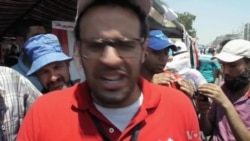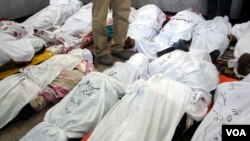Egyptian authorities say fighting between security forces and supporters of ousted president Mohamed Morsi has killed at least 74 people in Cairo and Alexandria since Friday.
In one of the bloodiest periods since the Egyptian military toppled President Morsi earlier this month and put him under house arrest, Morsi's Muslim Brotherhood movement say police fired into unarmed demonstrators in Cairo's Nasr City, where members have been camped for weeks demanding his reinstatement.
Egyptian official deny this, saying police only fired tear gas and that pro-Morsi marchers were responsible for the violence.
At a Saturday news conference, a spokesman for Morsi's Muslim Brotherhood movement Ahmed Arif also criticized Egyptian state media for what he described as biased coverage of the unrest.
Story continues below photo gallery
In Alexandria, Egyptian authorities said people inside a mosque fired shots into the surrounding neighborhood Saturday while Morsi supporters say gunmen shot into the mosque.
Doctors at the field hospital in Cairo said they were being overwhelmed. The facility is located at the site of a sit-in in Cairo's Nasr City, a Muslim Brotherhood stronghold, where protesters have been camped for more than three weeks.
VOA correspondent Elizabeth Arrott in Nasr City says several make-shift brick walls have been built between where security forces and emergency personnel are massed and the edge of the protesters' encampment on Nasr Street. It is unclear who built them.
The interior minister said Saturday that the interim government hopes to dismantle the protest camp using "legal means." He also said Morsi would most likely be taken to the Torah prison near Cairo, where former president Hosni Mubarak and members of his cabinet were detained following the country's 2011 uprising.
World reaction
World leaders are expressing increasing concern about the rising violence, the polarization of Egyptian society, and the army's crackdown on Brotherhood leaders.
U.S. Secretary of State John Kerry calls this period a pivotal moment for Egypt and warns that violence is a setback for reconciliation and democracy.
He says Egyptian authorities are morally and legally obligated to respect the right of free speech and assembly. He is calling for an impartial investigation into the latest violence.
Morsi has been held in secret military detention since July 3. Officials say they are investigating allegations that he conspired with the Palestinian militant group Hamas.
The Egyptian military dominated Egyptian politics for decades until the overthrow of Mubarak, himself an ex-military commander. It has a long history of animosity toward the Muslim Brotherhood, which is Egypt's most organized political party.
In one of the bloodiest periods since the Egyptian military toppled President Morsi earlier this month and put him under house arrest, Morsi's Muslim Brotherhood movement say police fired into unarmed demonstrators in Cairo's Nasr City, where members have been camped for weeks demanding his reinstatement.
Egyptian official deny this, saying police only fired tear gas and that pro-Morsi marchers were responsible for the violence.
At a Saturday news conference, a spokesman for Morsi's Muslim Brotherhood movement Ahmed Arif also criticized Egyptian state media for what he described as biased coverage of the unrest.
Story continues below photo gallery
In Alexandria, Egyptian authorities said people inside a mosque fired shots into the surrounding neighborhood Saturday while Morsi supporters say gunmen shot into the mosque.
Doctors at the field hospital in Cairo said they were being overwhelmed. The facility is located at the site of a sit-in in Cairo's Nasr City, a Muslim Brotherhood stronghold, where protesters have been camped for more than three weeks.
VOA correspondent Elizabeth Arrott in Nasr City says several make-shift brick walls have been built between where security forces and emergency personnel are massed and the edge of the protesters' encampment on Nasr Street. It is unclear who built them.
The interior minister said Saturday that the interim government hopes to dismantle the protest camp using "legal means." He also said Morsi would most likely be taken to the Torah prison near Cairo, where former president Hosni Mubarak and members of his cabinet were detained following the country's 2011 uprising.
World reaction
World leaders are expressing increasing concern about the rising violence, the polarization of Egyptian society, and the army's crackdown on Brotherhood leaders.
U.S. Secretary of State John Kerry calls this period a pivotal moment for Egypt and warns that violence is a setback for reconciliation and democracy.
He says Egyptian authorities are morally and legally obligated to respect the right of free speech and assembly. He is calling for an impartial investigation into the latest violence.
Morsi has been held in secret military detention since July 3. Officials say they are investigating allegations that he conspired with the Palestinian militant group Hamas.
The Egyptian military dominated Egyptian politics for decades until the overthrow of Mubarak, himself an ex-military commander. It has a long history of animosity toward the Muslim Brotherhood, which is Egypt's most organized political party.







